The Speaker of the House of Representatives holds a pivotal role in the United States government, serving as a critical link between the executive and legislative branches. As the presiding officer of the House of Representatives, the Speaker is not only a symbol of governmental authority but also a key player in shaping national policy.
Key Take Aways
- The Speaker of the House plays a crucial role in the U.S. government, acting as a bridge between the executive and legislative branches and having significant influence on the legislative process and national policy.
- Beyond public duties, the Speaker’s internal governance role is pivotal, involving leadership skills that affect the efficiency and effectiveness of legislative work.
- The Speaker’s position, being second in the presidential line of succession, underscores the high level of trust and responsibility vested in this role, reflecting its importance in the continuity of government and political landscape.
Table of Contents
- The Speaker of the House
- The job of Speaker of The House
- How Is The Speaker of The House Elected?
- Why is the Speaker of The House So Powerful?
- Speaker of the House of the United States
- List of Speaker of The House
- Speaker of the House Dennis Hastert Republican – Illinois 14th District
- Dennis Hastert faced legal issues
- Hastert Was Sentenced to 15 Months in Prison.
- Speaker of the House Nancy Pelosi Democratic – California 8th District, later the 12th District
- John Boehner Republican – Ohio 8th District
- Speaker of the House Paul Ryan Republican – Wisconsin 1st District
- Speaker of the House Kevin McCarthy (Republican – California 20th District)
- Speaker of the House Leader Mike Johnson (Republican – Louisiana District 4)
- Why is the Speaker of The House Important?
- Frequently Asked Questions
The Speaker of the House
The Speaker of the House of Representatives holds a position of significant influence and importance in the United States government.
As the presiding officer of the House of Representatives, the Speaker plays a critical role in the legislative process, including the power to control the flow of legislation and to set the legislative agenda.
The Speaker is second in the presidential line of succession, following the Vice President, which underlines the high level of trust and responsibility vested in this position.
Moreover, the Speaker often acts as a prominent figure in national politics, embodying the policies and priorities of the majority party within the House, and can have a considerable impact on national policy debates and the direction of government action.
The job of Speaker of The House
The Speaker of the House leads the House of Representatives, overseeing its operations and influencing both public and behind-the-scenes activities. They handle internal governance, like committee assignments and procedural rules, crucial for legislative efficiency.
Their role involves skilled negotiation and consensus-building within their party and with opponents, vital for addressing national issues. This makes the Speaker not just a political figure but a key player in federal governance.
How Is The Speaker of The House Elected?
The Speaker of the House is elected by the members of the United States House of Representatives, typically at the beginning of each new Congress. This process occurs every two years, coinciding with the convening of a new congressional session following national elections. The election of the Speaker is the first order of business for the House of Representatives and is outlined in the Constitution of the United States.
While any member of the House can be nominated for the Speaker’s position, the nominee is usually a senior member of the majority party. The election is conducted by a roll call vote, where each representative casts a vote for a candidate. To be elected as the Speaker, a candidate must receive an absolute majority of the votes cast. If no candidate secures this majority, the voting process is repeated until a Speaker is elected. The election of the Speaker is a critical moment, as it sets the tone for the legislative agenda and partisan dynamics for the upcoming congressional session.
Why is the Speaker of The House So Powerful?
The Speaker of the House is powerful because they lead the House of Representatives, influencing legislation, and overseeing its operations. They control the legislative agenda, decide which bills are debated, and have significant sway over committee assignments.
Additionally, as second in line for the presidency, their position holds considerable importance in the U.S. political hierarchy. This combination of legislative, procedural, and symbolic roles makes the Speaker a central figure in American politics.
Speaker of the House of the United States
Historical Context and Evolution of the Role
The Speaker of the House has been a pivotal figure in American politics since the role’s establishment in 1789.
Historically, the Speaker’s position has evolved significantly, mirroring the changes and developments within the U.S. political landscape. Initially, the role was primarily procedural, focused on presiding over legislative sessions and maintaining order.
However, over time, as the nation grew and the complexities of governance increased, the Speaker’s role expanded. This evolution saw the Speaker gaining substantial influence in legislative agenda-setting, political strategy, and party leadership.
The position’s prominence and power have varied depending on the individual office holders and the political context of their tenure, making it a barometer of sorts for the prevailing political dynamics of different eras in American history.
List of Speaker of The House
Notable Speakers of the House of Representatives since 2000, along with the terms they served:
Speaker of the House Dennis Hastert Republican – Illinois 14th District
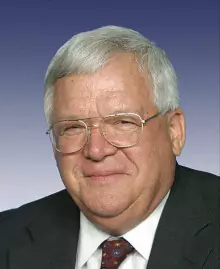
American Republican politician who served (1987–2007) in the U.S. House of Representatives, where he was speaker of the House from 1999 to 2007.
| Congress | Served As Speaker | Ending |
|---|---|---|
| 107th | January 3, 2001 | January 3, 2003 |
| 108th | January 7, 2003 | January 3, 2005 |
| 109th | January 3, 2005 | January 3, 2007 |
During his tenure as Speaker of the House, Dennis Hastert was instrumental in passing several key pieces of legislation. Notably, he played a significant role in the enactment of the following:
Dennis Hastert Notable Bills
- No Child Left Behind Act (2001): This act was a major education reform bill aimed at improving student achievement and changing the federal role in K-12 education.
- Medicare Prescription Drug, Improvement, and Modernization Act (2003): This legislation introduced Medicare Part D, providing prescription drug coverage for the elderly and disabled.
- USA PATRIOT Act (2001): Hastert helped pass this act, which expanded the authority of U.S. law enforcement for the stated purpose of fighting terrorism in the United States and abroad.
- Bush Tax Cuts: Under his leadership, the House passed a series of tax cuts in 2001 and 2003, which were a significant part of President George W. Bush’s economic policy.
- Homeland Security Act (2002): Hastert was in office when the act that created the Department of Homeland Security was passed, centralizing many security functions of the federal government.
Dennis Hastert faced legal issues
After his tenure as Speaker of the House. He pleaded guilty to structuring multiple withdrawals from bank accounts to avoid financial reporting requirements. These withdrawals were used to pay hush money to individuals who accused him of sexual abuse during his time as a high school teacher and wrestling coach.
Hastert Was Sentenced to 15 Months in Prison.
Followed by two years of supervised release and was required to participate in a sex offender treatment program. The sentencing judge labeled Hastert a “serial child molester,” highlighting the severity of the allegations against him
Speaker of the House Nancy Pelosi Democratic – California 8th District, later the 12th District
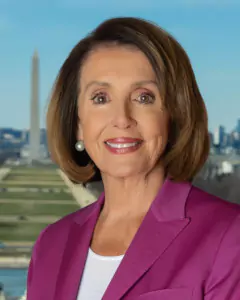
Nancy Pelosi has represented San Francisco in Congress for more than 35 years. She served as the 52nd Speaker of the House of Representatives.
| Congress | Served As Speaker | Ending |
|---|---|---|
| 110th | January 4, 2007 | January 3, 2009 |
| 111th | January 6, 2009 | January 3, 2011 |
| 116th | January 3, 2019 | January 3, 2021 |
| 117th | January 3, 2021 | January 3, 2023 |
Nancy Pelosi’s tenure as Speaker of the House achievements and actions included leading the Democrats to regain control of the House in the 2006 midterm elections. Becoming the first woman to serve as Speaker of the House. Her opposition to the Iraq War and resisting attempts to privatize Social Security.
Nancy Pelosis Notable Bills
- Patient Protection and Affordable Care Act (“Obamacare”): Pelosi played a pivotal role in the passage of this significant healthcare reform law.
- Dodd–Frank Wall Street Reform and Consumer Protection Act: She was a key player in the enactment of this act, which aimed to reform financial regulation in the wake of the 2008 financial crisis.
- Don’t Ask, Don’t Tell Repeal Act of 2010: Pelosi had a significant role in the passage of this act, which ended the U.S. military’s policy barring openly gay, lesbian, or bisexual persons from service.
- American Rescue Plan Act of 2021: Pelosi was crucial in passing this act in response to the COVID-19 pandemic, providing economic relief and support.
- Infrastructure Investment and Jobs Act of 2021: As a leading figure, Pelosi facilitated the adoption of this act focusing on infrastructure improvement and job creation.
- CHIPS and Science Act of 2022: Contributed significantly to the passage of this act to boost semiconductor manufacturing in the U.S.
- Inflation Reduction Act of 2022: Influential in the passage of this act, addressing key issues like climate change, healthcare costs, and tax reform.
- Ryan White CARE Act: Co-authored this act, providing treatment and services for those impacted by HIV/AIDS, signed into law in December 1990.
- Civil Rights Restoration Act of 1987: In March 1988, Pelosi voted for this act and participated in overriding President Ronald Reagan’s veto.
Pelosi’s Career
Additionally, Pelosi’s career milestones include being elected as the House minority whip in 2001, the first woman in U.S. history to hold that position, and opposing the Iraq Resolution in 2002. She became the House minority leader in November 2002, the first woman to lead a major party in either chamber of Congress. These achievements paved the way for her eventual election as the first female Speaker of the House, marking a historic milestone in U.S. politics.
John Boehner Republican – Ohio 8th District
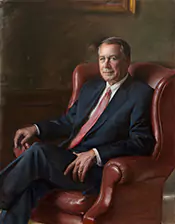
Boehner distributed funds from tobacco industry representatives to several GOP within the legislative assembly building.
Boehner is known for his frequent smoking habit (often seen with a cigarette and a glass of red wine).
| Congress | Served As Speaker | Ending |
|---|---|---|
| 112th | January 5, 2011 | January 3, 2013 |
| 113th | January 3, 2013 | October 29, 2015 |
John Boehner’s Notable Achievements
During John Boehner’s tenure as Speaker of the House, his notable achievements and actions included:
- Leading the Republicans to a majority in the House during the 2010 midterm elections with a net gain of 63 seats.
- Upholding the tradition of the Speaker’s role by not taking part in debate or voting from the floor, and not being a member of any House committees during his Speakership.
- Initiated a lawsuit in July 2014 to enforce the imposition of penalties on companies that failed to provide health care coverage for their employees, as mandated by the Affordable Care Act.
- Facilitating the address to Congress by Pope Francis in September 2015, which Boehner considered the high point of his legislative career.
Boehner’s resignation in October 2015 marked the end of his leadership, which was characterized by efforts to navigate the complexities of governance amid increasing discord within his party and the legislative body as a whole.
Speaker of the House Paul Ryan Republican – Wisconsin 1st District
Serving as the 54th Speaker of the House has been the honor of a lifetime. I will forever be thankful to the people of Wisconsin’s 1st Congressional District for the ability to work for them and the exceptional country that we love and call home. God bless you and God bless the United States of America.
– Paul Ryan
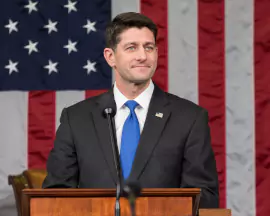
| Congress | Served As Speaker | Ending |
|---|---|---|
| 114th | October 29, 2015 | January 3, 2017 |
| 115th | January 3, 2017 | January 3, 2019 |
During his tenure in Congress, Paul Ryan successfully got only a small number of bills passed into law. The most notable ones include:
Paul Ryan Notable Bills
- Name Change of a Post Office: Sponsored a bill to rename a post office in his hometown, a typical example of local-focused legislation by Congress members.
- American Health Care Act of 2017: Spearheaded this significant health care legislation, which passed the House but failed in the Senate.
- Bipartisan Budget Act of 2013: Instrumental in this act, aimed at reducing the federal deficit by $23 billion, balancing increased spending for defense and nondefense without altering entitlement programs.
- Legislation as Chair of the House Ways and Means Committee: Sponsored nine bills from January to June 2015, influencing various policies.
- American Health Care Act (AHCA): As Speaker, he led the effort to repeal and replace the ACA, passing the House but not the Senate.
- Tax Cuts and Jobs Act of 2017: Drove the passage of this major tax reform bill, which lowered individual and corporate tax rates, signed into law by President Trump.
- Government-Wide Spending Bill: Advocated for a $1.3 trillion bill, significantly boosting military spending.
- Sanctions on Russia: Supported strong sanctions in response to Russia’s interference in the 2016 elections and the annexation of Crimea, leading to the passage of a sanctions bill with veto-proof majorities.
- Economic Growth, Regulatory Relief, and Consumer Protection Act (May 2018): Led the passage of this act, which partially repealed the Dodd-Frank Act.
Ryans Contributions
These highlights showcase Paul Ryan’s influence and contributions to various legislative initiatives during his tenure in Congress. Ryan’s time as Speaker also included efforts to reform entitlement programs and reduce the federal deficit, although these goals were not fully realized during his time in office. He announced his decision not to run for re-election in April 2018, citing his desire to have done his part to set the country on a better course
Paul Ryan was appointed to the Board of Directors of Fox Corporation in March 2019. This appointment occurred after he had served as the Speaker of the House and did not seek re-election in 2018. Fox Corporation is the parent company of Fox News, and the role on the board marks a significant post-political career move for the former Speaker.
Speaker of the House Kevin McCarthy (Republican – California 20th District)
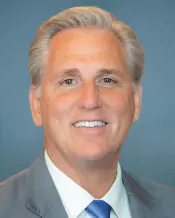
When you look at the Democrats, they actually look like America,” he said. “When I look at my party, we look like the most restrictive country club in America".
Quote comes from a debate McCarthy took part in at Oxford University on October 28, 2023.
| Congress | Served As Speaker | Ending |
|---|---|---|
| 118th | January 7, 2023 | October 3, 2023 |
During Kevin McCarthy’s tenure as Speaker of the House, his notable legislative achievements included:
Kevin McCarthy’s Bills
- Government Shutdown Avoidance: Implemented a 47-day funding resolution, averting a government shutdown, signed by President Biden.
- Debt Ceiling Raise: Played a key role in suspending the debt limit until January 1, 2025.
- COVID-19 Declassification: Led the House vote to declassify information regarding the origins of COVID-19.
- Energy Legislation: Oversaw the passage of H.R. 1, the Lower Energy Costs Act, to increase domestic energy production, though it stalled in the Senate.
- Appropriations Bills: Involved in passing various bills, including those for military construction and veterans affairs, facing Democratic resistance.
- Investigations: Conducted investigations into the Biden family and alleged Justice Department weaponization.
- UAP Information Rights: Supported public access to information on Unidentified Aerial Phenomena.
- Committee on Chinese Communist Party: Garnered bipartisan support for establishing the Select Committee on the Chinese Communist Party.
Speaker of the House Leader Mike Johnson (Republican – Louisiana District 4)

He is in only his fourth term and has never served in a senior leadership position or even as a full committee chair before he was elected Speaker.
| Congress | Served As Speaker | Ending |
|---|---|---|
| 118th | October 25, 2023 | We’ll See |
Mike Johnson is a notable American lawyer and Republican politician who has achieved several accomplishments. Namely, he led an amicus brief in support of a Texas lawsuit seeking to overturn Joe Biden’s 2020 victory in four battleground states.
During the 2020 election certification, U.S. Representative Mike Johnson was involved in efforts that questioned the legitimacy of the election results. He supported claims of voting machine irregularities and expressed the belief that the election was rigged particularly in Georgia.
Johnson was one of 37 Republicans who, before Congress convened on January 6. Announcing their intention to object to the electoral college results of states they believed violated the Constitution in the 2020 presidential election. Despite his objections to the election results, Johnson condemned the Capitol attack on January 6 and later acknowledged Joe Biden as the president-elect
Before his political career, Johnson worked for eight years as a senior attorney and national spokesperson for the Alliance Defending Freedom. This group, labeled by the New York Times as a major legal force for the religious right, focuses on issues such as opposing abortion and advocating for conservative views on LGBTQ+ rights.
The Alliance Defending Freedom has been instrumental in significant legal battles, including a case that contributed to the Supreme Court’s decision to overturn Roe v. Wade, securing numerous legal victories for conservative religious causes
Mike Johnson’s legislative record
Role in Congress: Elected in 2016; vice-chair of the House Republican Conference; chair of the Republican Study Committee (2021-2023).
Legislation: Involved in overhauling the Endangered Species Act (2018).
High-Profile Activities: Served on President Trump’s defense team during the 2021 impeachment; supported a lawsuit challenging the 2020 election results.
Key Votes in the 117th Congress: Opposed the Infrastructure Investment and Jobs Act, the American Rescue Plan Act of 2021, the Inflation Reduction Act of 2022, and the For the People Act of 2021; supported the National Defense Authorization Act for Fiscal Year 2022.
Votes in the 115th Congress: Supported the Agriculture and Nutrition Act of 2018, the Pain-Capable Unborn Child Protection Act, Kate’s Law, the No Sanctuary for Criminals Act, and the American Health Care Act of 2017.
Why is the Speaker of The House Important?
The Speaker of the House is crucial because it shapes policy, controls legislative activities, and represents the House in dealings with the President and Senate. Their leadership affects party strategy and national governance, with the power to initiate legislation, negotiate compromises, and set the House’s agenda. This position’s significance extends beyond politics, impacting the overall direction of government action and public policy.
Beyond legislative duties, the Speaker is the public face of the House, representing it to other branches of government and foreign dignitaries, and they have a key role in ceremonial functions, such as administering oaths of office, signing legislation, and presiding over joint sessions of Congress.
The Speaker’s position is not only symbolic of the House’s authority but is also practical in orchestrating the law-making process. As second in line to the presidency, the Speaker also holds a critical place in the constitutional line of succession, underscoring their importance in the continuity of government. The Speaker’s role, therefore, is fundamental to the function and governance of the House and has a significant impact on the political landscape of the United States.
Frequently Asked Questions
What is the role of the Speaker of the House?
The Speaker of the House is the presiding officer of the U.S. House of Representatives, responsible for managing House proceedings, and legislative agendas, and representing the House in discussions with the President and Senate.
How is the Speaker of the House chosen?
The Speaker is elected by the members of the House of Representatives at the beginning of each new Congress.
What powers does the Speaker of the House have?
The Speaker controls the legislative calendar, oversees House debates, assigns committee memberships, and represents the House in high-level negotiations.
Who was the first Speaker of the House?
The first Speaker was Frederick Muhlenberg, elected in 1789. of the House?
Why is the Speaker of the House important?
The Speaker influences the legislative agenda, guides party strategy, and plays a key role in shaping national policy.
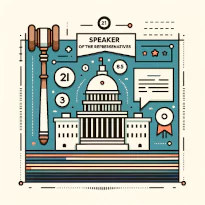
Thanks for sharing excellent informations. Your website is very cool. I am impressed by the details that you have on this web site. It reveals how nicely you perceive this subject. Bookmarked this website page, will come back for more articles. You, my pal, ROCK! I found simply the info I already searched everywhere and just could not come across. What a great web site.